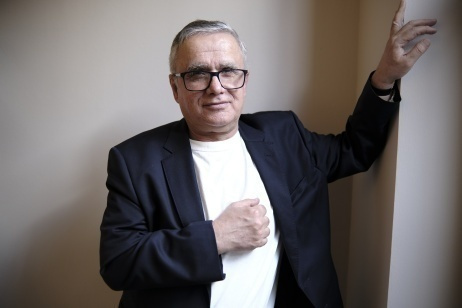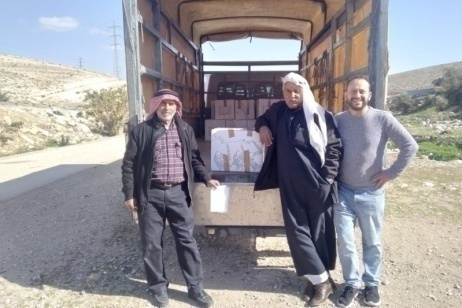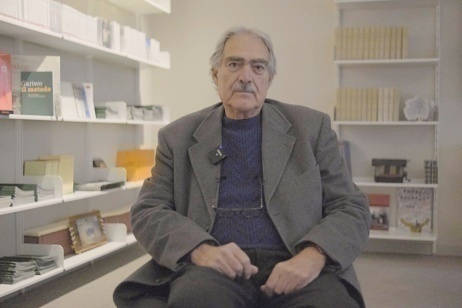If there is a Garden of the Righteous in Halabja, much of it is due to the determination of Qayssar Ahmed. A survivor of the 1988 genocide, once he returned from the tent cities in Iran, Qayssar became a journalist and communications expert. Director of Radio Dangi NWE, a community radio station for young people and women, he is a member of the Kurdistan journalists' union and the International Federation of Journalists. But above all, together with his wife Hero, he is the driving force behind the NWE organization, which pioneeringly fights to connect the memory of the genocide to today's struggles: freedom of expression, women's rights, environmental protection. On the eve of the 35th anniversary of the Halabja genocide, where over 5,000 people lost their lives at the hands of Saddam's troops, Qayssar tells Gariwo about the biggest challenges facing this border community - between Islamist threats, corruption, energy crisis and drought - at one of the most delicate moments in the history of the region.
How is everything going in Halabja?
Currently, the situation in Halabja, as well as in Kurdistan more generally, is very difficult for its residents. The relationship between the central government and Kurdistan is not good, and there are constant problems regarding oil and the budget allocated to the city. On the other hand, the two main Kurdish parties have problems with each other over issues concerning power management, oil and money. These problems have made the situation unstable and uncertain in the region, and traders and investors do not want to implement projects in Kurdistan.
We have read that you have had to deal with an extremely harsh winter and at the same time had to manage an energy crisis and, as a result, a crisis of relations with the government.
Yes, it is very cold and fuel is too expensive. So the hours of electricity supply are few, despite being a fundamental necessity for people at this time. Therefore, some people have been forced to go to the mountains to cut down trees and burn them to keep warm, causing damage to the environment in the area.
Along with environmental issues, NWE is also involved in women's rights. How are your projects proceeding?
Currently, we are working, with the support of the Dutch Consulate in Erbil, on a project that includes seminars for women in the villages of the Halabja province on women's rights and female genital mutilation. We also receive support from the organization Wadi for renting our office and office expenses, and we are waiting for responses for funding for new projects.
What are the main difficulties encountered in this activity?
The main problems facing women in Halabja are: the constant violence they suffer from their fathers, brothers, and husbands; lack of awareness of their rights; the lack of employment opportunities for women and girls; the impact of Islamic groups on violence against women and girls.
Have you received any threats?
Our organization is constantly threatened because we are the only organization in Halabja that talks about women's rights, gender, and female genital mutilation. Therefore, we often receive threats and defamation. Most of the threats come from Islamic groups and their supporters. Last month, the Tehran government pressured Islamic parties affiliated with it to create problems for organizations so that they do not deal with protests in Iran.
Supporters of Islamic groups prevented a group of women from holding seminars at Halabja University, and in Khurmal, an organization that wanted to hold seminars for students on women's rights was fired.
Supporters of Islamic groups prevented a group of women from holding seminars at the University of Halabja, and in Khurmal, they dismissed an organization that wanted to hold seminars for students on women's rights.
What are the most important outcomes of these seminars?
Thanks to our seminars and meetings with girls and women, they become aware of their rights and are able to defend themselves when they experience violence, as well as speak to social workers or lawyers when they are in difficulty.
Additionally, within the framework of awareness seminars, we are about to open sewing and hairdressing seminars to help women become entrepreneurs and open their own shops. We will teach them how to write a resume and look for job opportunities. In this way, women and girls are less exposed to violence, which can contribute to a healthy generation for society, so that everyone respects the values of human rights and humans live in peace and freedom.
What are the main challenges of the region?
Actually, there are many things that worry the people of this city. Certainly, the lack of work that increases day by day and the increase in the prices of consumer goods such as food, gasoline and oil, and the rise in the price of the US dollar. To this must be added the low rainfall that puts drought, aridity of the land, and the decline in the rate of groundwater at risk. As if that were not enough, there are tensions between Kurdish parties and the government in Baghdad, and even Kurdish parties fight among themselves.
And then there are foreign interferences: the increase in the number of Islamists supported by Iran and Arab countries. On the other hand, European and American organizations have decreased, as has cooperation with civil society organizations in Kurdistan.
What is your impression of the future of Iraq?
For all the reasons I listed, the future of Iraq appears difficult. It's not just my opinion, it's the same as many politicians and sociologists. As I answer these questions, there are three different demonstrations in three different parts of Iraq: one is for gasoline, another for the increase in the price of the dollar, and the third for the lack of job opportunities.
Despite all these problems, we continue to work with hope to serve our community, improve the lives of citizens, particularly in the areas of human rights and environmental protection.







